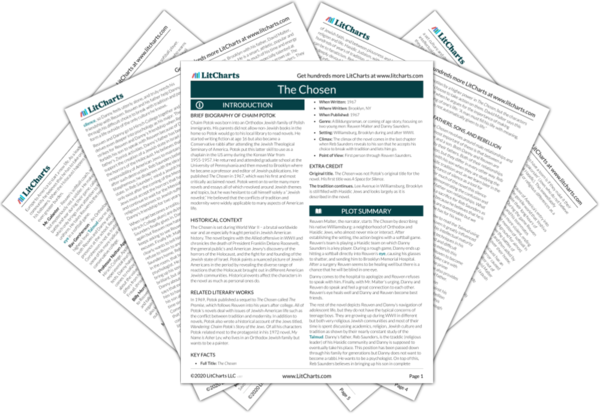The title, The Chosen, introduces this theme immediately into the novel. First of all, in a novel about Jewish people and culture the term carries a religious meaning: the idea written in the Torah that Jews are the people chosen by God. This means that practicing Jews believe that they have a specific and exclusive order to follow and obey God. “Chosenness,” as it is called, is seen in the way that Danny and Reuven’s fathers teach them the responsibility that they have towards God and Jewish laws and customs. The novel then brings up the question of responsibility among chosen people: is there free will within this structure, or must the characters only follow the path given to them as chosen people?
This conflict of choice plays out in the relationship between Danny Saunders and his father, Reb Saunders. Danny is supposed to follow in his father’s footsteps as the next tzaddic (leader of the Hasidic community). His family has passed this role down through six generations, and Reb Saunders has been preparing his son since he was a small child. Danny, on the other hand, is interested in psychology and Freud, and does not want to become a rabbi. Much of the novel focuses on Danny’s guilt and confusion over whether he should follow his dreams or his familial and religious responsibility. His choice to veer from what seems to be his fate, and his father’s acceptance of his new secular life path, demonstrates the value of individual choice within the novel. In a world of so much tradition and religious responsibility, Potok argues for the value of individual choice.
Danny and Reuven’s friendship shows a combination of both choosing and being chosen. They seem almost thrown together by fate in the dramatic softball game that starts the novel. Yet although it seems like they should hate each other after Danny injures and nearly blinds Reuven, David Malter encourages them to choose to become friends. Events often seem to be set in motion by a higher power in The Chosen, but the characters must choose to take action on them. David Malter says this himself when he argues for the importance of making something of one’s life: “A man must fill his life with meaning, meaning is not automatically given to life.”
Choosing and Being Chosen ThemeTracker

Choosing and Being Chosen Quotes in The Chosen
I couldn’t imagine what it was like to know that no matter whether my eyes were opened or closed it made no difference, everything was still dark.
“What I tried to tell you, Reuven, is that when a person comes to talk to you, you should be patient and listen. Especially if he has hurt you in any way.”
I stood in that room for a long time, watching the sunlight and listening to the sounds on the street outside. I stood there, tasting the room and the sunlight and the sounds …
“Reuven, as you grow older you will discover that the most important things that will happen to you will often come as a result of silly things, as you call them – ‘ordinary things’ is a better expression. That is the way the world is.”
A spider had spun a web across the corner of the upper rail, and there was a housefly trapped in it now, its wings spread-eagled, glued to the strands of the web, its legs flaying the air frantically.
It was as senseless, as – I held my breath, feeling myself shiver with fear – as Billy’s blindness was senseless. That was it. It was as senseless, as empty of meaning, as Billy’s blindness. I lay there and thought of Roosevelt being dead and Billy being blind, and finally I turned over and lay with my face on the pillow and felt myself crying. I cried a long time.
“The world kills us,” he said quietly.” Ah, how the world kills us.” … “The world drinks our blood,” Reb Saunders said. “How the world makes us suffer. It is the will of God. We must accept the will of God.”
“I am not satisfied with it either, Reuven. We cannot wait for God. If there is an answer, we must make it ourselves.”











